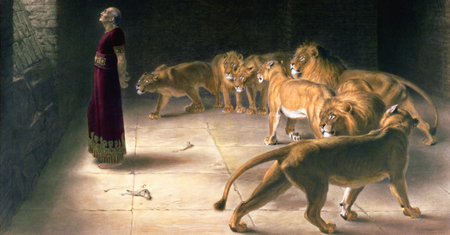
The Greek word translated “faithful” in the New Testament is defined thus by Thayer:
1) trusty, faithful;
1a) of persons who show themselves faithful in the transaction of business, the execution of commands, or the discharge of official duties;
1b) one who kept his plighted faith, worthy of trust; 1c) that can be relied on.
Consider definition 1a) related by Thayer. The term is used of persons who show themselves faithful in the execution of commands, or the discharge of duties. This is a significant truth. Throughout scripture, people faithful to God were considered faithful by Him because they obeyed His commands, and did what was required.
Consider the book of Daniel. The third chapter of that book reveals that King Nebuchadnezzar had erected an idol in the land, and commanded all in the kingdom to fall down to worship the image. However, Shadrach, Meshach and Abed-Nego refused to worship the image as the king had commanded. For this the king threatened to throw them into a burning fiery furnace as punishment. They responded, “O Nebuchadnezzar, we have no need to answer you in this matter. If that is the case, our God whom we serve is able to deliver us from the burning fiery furnace, and He will deliver us from your hand, O king. But if not, let it be known to you, O king, that we do not serve your gods, nor will we worship the gold image which you have set up” (Daniel 3:16-18).
The three Jewish men were well acquainted with God’s commandment, “You shall not make for yourself a carved image—any likeness of anything that is in heaven above, or that is in the earth beneath, or that is in the water under the earth; you shall not bow down to them nor serve them” (Exodus 20:4-5). Their faithfulness led to God’s sparing them from the furnace, and served as a testimony to the king. He said, “Blessed be the God of Shadrach, Meshach, and Abed-Nego, who sent His Angel and delivered His servants who trusted in Him, and they have frustrated the king’s word, and yielded their bodies, that they should not serve nor worship any god except their own God!” (Daniel 3:28).
Later in the book, a similar thing happened to Daniel himself. King Darius had instituted a decree that no god should be petitioned for 30 days except for the king himself. David, who was faithful to God, refused to obey the command. “Now when Daniel knew that the writing was signed, he went home. And in his upper room, with his windows open toward Jerusalem, he knelt down on his knees three times that day, and prayed and gave thanks before his God, as was his custom since early days” (Daniel 6:10). Though he was thrown into the den of lions, God protected him. The king, who was upset that his decree had endangered Daniel’s life, had told Daniel, “Your God, whom you serve continually, He will deliver you” (6:16).
If throughout the Old and New Testaments faithfulness has been shown through obeying commands and doing what is required by God, why do some today say that obedience is not required? Such a concept of grace so often promoted by religious people is flawed! As Paul wrote, “What shall we say then? Shall we continue in sin that grace may abound? Certainly not! How shall we who died to sin live any longer in it?” (Romans 6:1-2).
Remember, “And having been perfected, He became the author of eternal salvation to all who obey Him” (Hebrews 5:9). Faithfulness, and the reward it brings, necessitates our learning and obeying the commands of God!
To see The Patternists Page on Facebook, click here, and Like!




